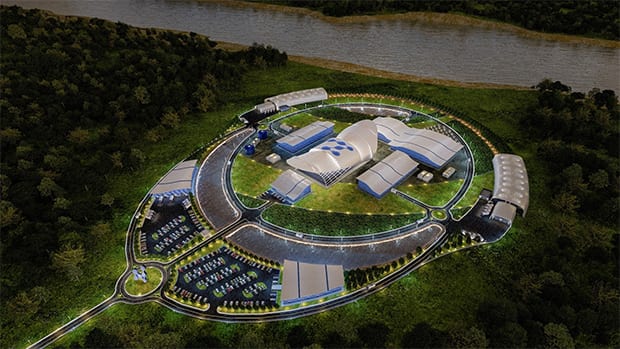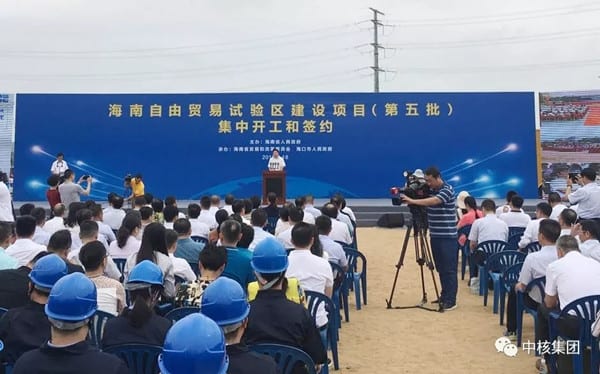Positive Developments for Small Modular Reactors
Credit to Author: Aaron Larson| Date: Mon, 29 Jul 2019 21:05:47 +0000
NuScale Power, Rolls-Royce, and China National Nuclear Corp. (CNNC)—three companies working on different small modular reactor (SMR) technology—recently announced positive developments for their respective designs.
NRC Makes Progress on NuScale Design Review
Portland, Oregon-based NuScale said on July 22 that the U.S. Nuclear Regulatory Commission (NRC) completed the second and third phases of its SMR design review (Figure 1). The milestone was reached six weeks ahead of schedule, according to the company, putting NuScale “on a path to beat foreign competitors like Russia and China in a global SMR race.”

1. An artist’s rendering of a NuScale SMR site. Courtesy: NuScale Power
“Completing Phases 2 and 3 of the NRC’s design review certification process is a critical milestone for our company and the advanced nuclear industry,” NuScale Chairman and CEO John Hopkins said in a press release. “We appreciate the work of the experts at the U.S. Nuclear Regulatory Commission as they conduct their thorough and rigorous review of our groundbreaking technology. We look forward to helping the NRC complete its review and bringing our first plant online at the Idaho National Laboratory in 2026.”
The NRC is expected to finish its review by September 2020. The project in Idaho is being planned by Utah Associated Municipal Power Systems (UAMPS), an energy services interlocal agency of the State of Utah. UAMPS provides a variety of power supply, transmission, and other services to 47 members, which include public power utilities in Utah, California, Idaho, Nevada, New Mexico, and Wyoming. Thirty-three members are currently participating in the SMR project, which is expected to include 12 individual 60-MW modules.
On July 17, UAMPS said participating members had executed power sales contracts totaling more than 150 MW of subscription in the project, which triggered continued work and evaluation, including increased focus on site characterization and preparation of a Combined License Application for submittal to the NRC. As the project moves forward, UAMPS said opportunities will exist for existing members to exit and others to join the project, if so desired.
Construction of the facility is scheduled to begin in 2023, with the first module starting operation in 2026. Other modules are expected to come online soon thereafter.
UK Government Pledges Money to Develop SMR Program
A day after the NuScale news broke, Rolls-Royce announced that the UK government had committed £18 million ($22 million) to advance an SMR program spearheaded by the company (Figure 2). The money is expected to lay the foundation for “a homegrown nuclear power plant industry” in the UK, through a consortium comprising Rolls-Royce, Assystem, SNC Lavalin/Atkins, Wood, Arup, Laing O’Rourke, BAM Nuttall, Siemens, National Nuclear Laboratory (NNL), and Nuclear AMRC. The members are said to “represent the best of British nuclear energy capability, infrastructure project experience, and manufacturing technology.”

2. An artist’s impression of a UK SMR design. Courtesy: Rolls-Royce
Funding from the government will be matched in part by contributions from the consortium and by attracting third-party investment. Rolls-Royce said the investment is needed to mature the design, address the considerable manufacturing technology requirements, and to progress the regulatory licensing process. It will also give companies within the UK supply chain the confidence needed to plan investments in capability.
CNNC Starts SMR Demonstration Project
At a ceremony on July 18 marking the commencement of the fifth batch of construction projects in Hainan Free Trade Pilot Zone (Figure 3), CNNC announced the start of its small multipurpose modular reactor demonstration project—Linglong One.

3. CNNC announced the start of its small multipurpose modular reactor demonstration project (Linglong One) at a ceremony in Hainan. Courtesy: CNNC
CNNC began researching the technology for Linglong One in 2010. It became the first SMR to pass an International Atomic Energy Agency safety review in 2016. The design is based on current pressurized-water reactor technology.
CNNC claims Linglong One has excellent safety features, “thanks to its integrative reactor design and passive automotive safety system.” The company said the demonstration project will verify the design, manufacture, construction, and operation of the technology. It will also help the company gain experience running small nuclear power stations and enable it to explore the future market for small reactors.
—Aaron Larson is POWER’s executive editor (@AaronL_Power, @POWERmagazine).
The post Positive Developments for Small Modular Reactors appeared first on POWER Magazine.